How to Conquer the Emotions of Decluttering
Today we’re going to talk about feelings. Now, you’re probably going, “What do my feelings have to do with my house? I thought this was a blog about home decorating?!” I’m here to tell you, home decorating can get emotional, y'all. Specifically, when it comes to decluttering your home.
I'm sharing my best PRACTICAL tips for how to handle the emotions of decluttering your home. These rules will make it EASY for you to conquer your clutter and keep it that way!
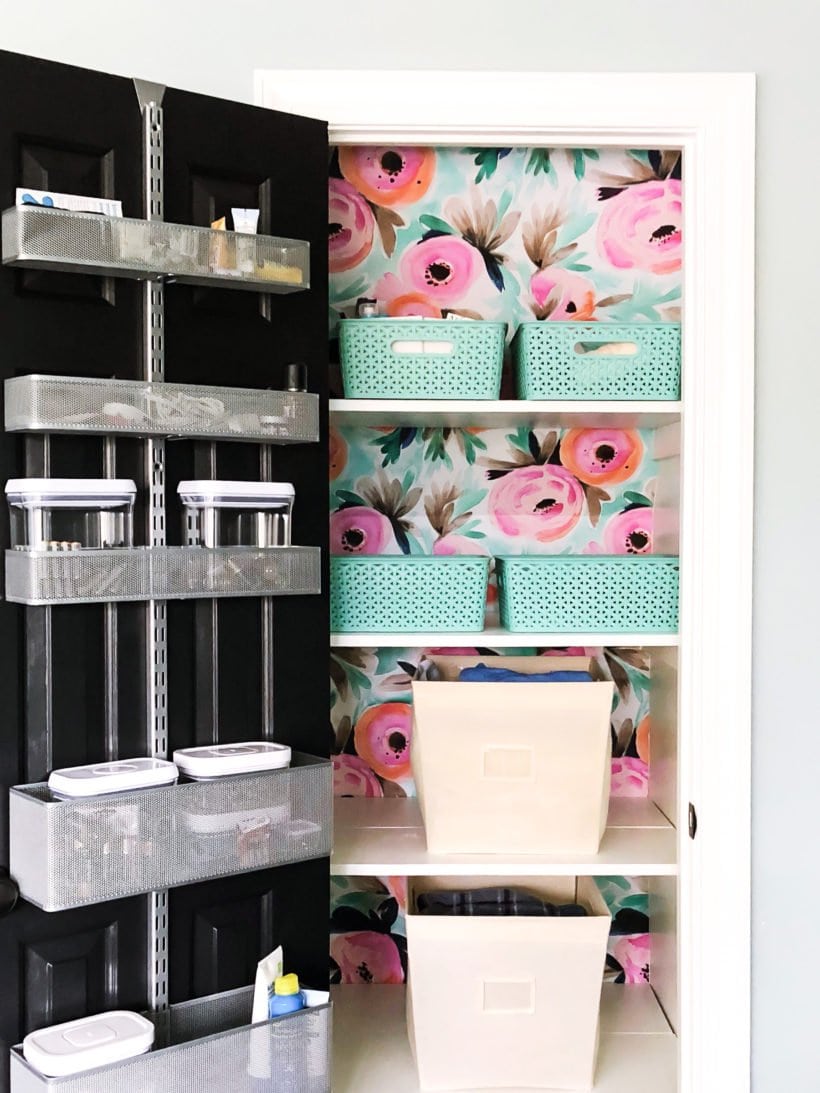
When my daughters outgrew their adorable toddler clothes and toys, I remember thinking it was going to be NO PROBLEM to get rid of them. But then, I looked at all those cute, sweet little items, and well, it was hard. I ended up storing them in our guest room closet, thinking I’d donate them when I found the time. Honestly, though, I felt myself dragging my feet a little. It felt like getting rid of memories.
Eventually, I rallied, put on my big girl panties and dealt with it. Largely, because our guest room closet was becoming a scary dumping ground of old bedding, clothes, toys and other stuff we hadn’t gotten around to trashing (or donating) yet. I wanted a clean, inviting room where guests could put their stuff. I wanted a useable, spacious closet for them to use.
There are other areas of our homes that we NEED to declutter, right? But we can’t quite push ourselves to deal with the organizing and deciding what to keep. Yep. It’s not limited to guest room closets. There’s the junk drawer, the pantry, the table in the entryway, our clothes closets, and the boxes in the attic and basement. We all have somewhere we hoard store our unused stuff.
If after reading this post, you feel ready to really start decluttering, be sure to check out my realistic guide on how to declutter your home the realistic way. And I highly recommend that you grab my ultimate cheat sheet for decluttering your home. It's only 1-page (NOT overwhelming) and is super helpful!
How to Handle the Emotions of Decluttering Your Home
When it’s time to let it go, organize and clean it out, it’s hard. It’s emotional. Sometimes it’s even a little painful. But it’s also rewarding. When your space is clean, organized, and welcoming, it’s calming. Your home should be your happy place. You shouldn’t feel like you’ve got to dig your way in and out. You should be able to relax and find what you need. Your home should be a sanctuary—a relief from (not a reflection of) the chaos of everyday life.
So, are you with me? Are you ready to get down to the nitty-gritty emotional stuff? Let’s deal with those emotions decluttering your home brings to the surface and take back our relaxing, inviting spaces! Let’s declutter!
Why Do We Hold On to Stuff?
If you want to learn to let it go, first address why you’re holding on. That sounds like relationship advice, doesn’t it? Well, in a lot of ways we build up relationships with our stuff.
We form emotional attachments to stuff. We associate our memories: our happy times, our darling little toddlers in matching pink jackets playing in the autumn leaves.
We keep gifts: the wedding presents we didn’t use yet (but are sure we will need a panini press someday), the books we plan to get to, the mementos from special moments.
We hold on to paper: the letters from friends, a card from our grandmother who passed, the “report cards” from preschool, and each and every piece of crayon-drawn artwork.
You see, guys, it’s not about the stuff. I know it’s heartbreaking to think of letting the items go, but remember, it’s not about the items themselves, but the memories we associate with them.
Breakdown your clutter and stuff to the basic components and what are you left with? Paper, fabric, wood, metal, glass and plastic. Raw materials. The memories are in our minds and hearts, not within the plastic, fabric or paper.
We’re afraid we’re going to disappoint someone by not using their gift. We’re nostalgic and pained to let go of those sweet little girls toddling around in their matching outfits. We’re scared to let go of the papers because each creation holds a precious message of how much we were cared for, thought of and loved.
See? I told you. Decluttering your home gets emotional, y'all! Are you feeling it?
But here’s the deal. For most of us, we’ve got way more stuff than we need or regularly use. In fact, the stuff we own prevents us from relaxing, finding what we need and living in peace as opposed to chaos. What we need gets buried by all the stuff we don’t, but still, hold on to. We can’t fully enjoy what we own, because we’ve got too much to deal with.
If you want an inviting, clean, restful and beautiful house, you’re going to need to declutter. If you look at Pinterest or Houzz with longing, wishing your home looked like those in the photos, you can get there! You need to clean out and organize.
So get ready. I know you can do it!
Getting Past the Emotions With 3 Simple Rules
The best way to get through the emotional upheaval of organizing decluttering your home is to set yourself up with a few rules. Now, I’m not one who loves rules and restrictions, but the former lawyer in me knows, setting up parameters removes the emotions.
You see, when you apply a rule to a situation you don’t need to delve into the feeling part of decluttering. You can push past it, by asking “does this meet the rules?” If it doesn’t, you’re assured you’re holding on for the emotions rather than the rationale. Decluttering is a very rational activity.
Ready?
Rule #1: Everything Must Have a Home
By home, I don’t mean, “the junk drawer.” Every item must have a proper, real home where it belongs. Not a pile on top of the kitchen counter, slung on the table in the hall or living in the dining room.
Having a family command center helps us a ton with avoiding piles of paper. You can see ours below. It keeps us from putting things down on our kitchen counters.
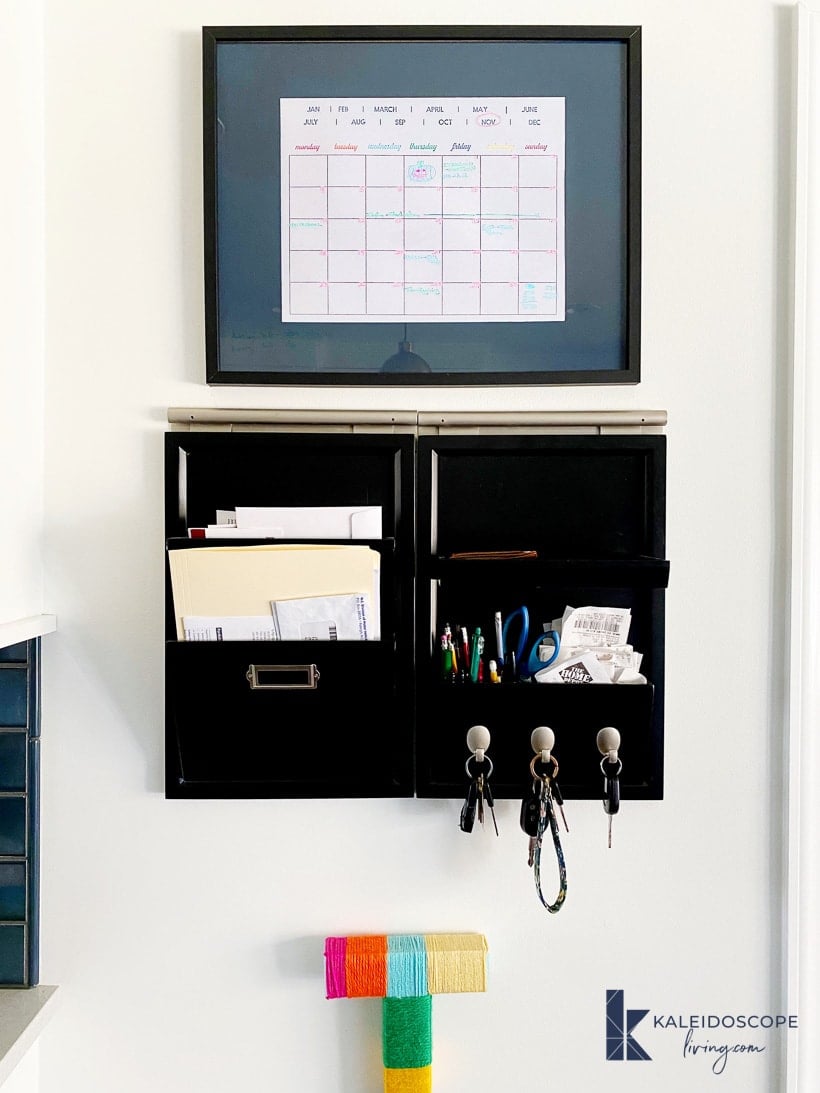
Our linen closet has a spot for everything from batteries, to towels, to medications. Everything has a designated spot. If it doesn't, it means we don't need it and we get rid of it.
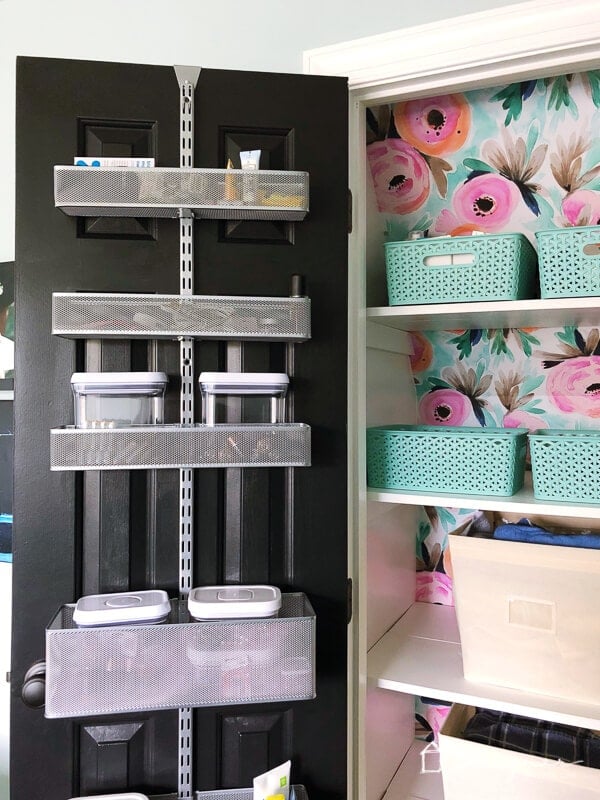
Toys go in the toy room in organized containers (these are my favorite playroom storage ideas). Books go on the bookshelf, neatly. Your kitchen cabinets are organized so you can easily access what you need and use every day. Spices go in the spice rack (check expiration dates-did you know spices expire?!). Your closet is organized and clothes are hung carefully in your closet on matching hangers. Can’t find enough space or hangers? It’s a sign: pare down to the items you have space for.
Now, seasonal items are an exception. For example, if you toss your sweaters in a bin the summer months or put holiday decorations in a box in the attic, you don’t need to toss them out every year (obviously). BUT, if a year passes and you don’t break out your seasonal accessories? Well, then it’s time to say goodbye.
Bottom line… Every item you own should have a home.
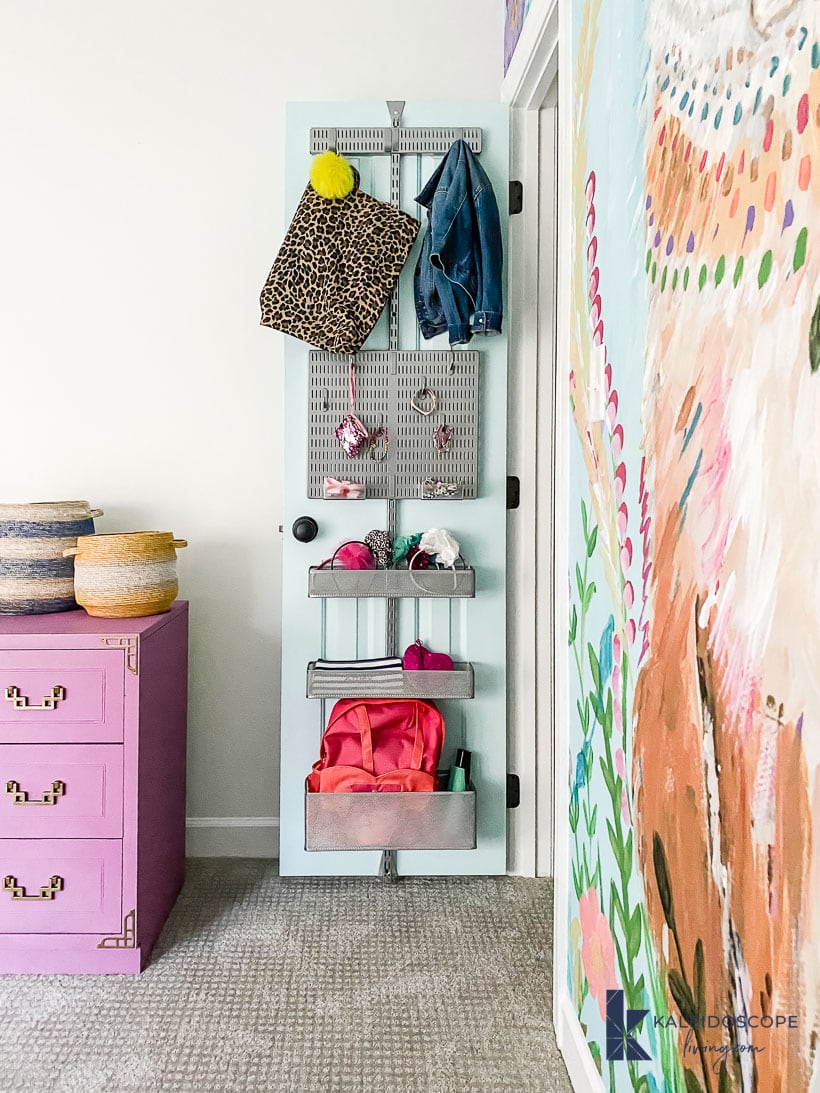
Rule #2 Everything Must Have a Current Purpose
So, how many of us hold on to items thinking we might need it someday? Maybe it was the fondue pot or panini press you got for your wedding. Maybe your pre-baby clothes you used to fit into. Maybe it’s framed art you don’t want to hang anymore, but can’t let go of.
Hanging on to all these items weighs you down. Everything you own, you should love. You should use and feel excited about. If the purpose of an item is to bring you joy (and like, serious happiness, not just “I kinda like this,”) then hold on to it. If the item doesn’t make you happy, then donate it.
Donating or selling items helps ease the pressure of feeling wasteful. When you donate an item, you’re giving it new life. Someone else who needs that fondue pot or that mini skirt will be thrilled to own it! It will get used and loved by a new owner.
That's exactly how I felt about my sweet girls' baby clothes. I love the fact that some other family will get to enjoy seeing their little girl(s) in those sweet clothes! And I also know that selling them at consignment sales (like we did recently) helps make them more affordable for many families. (I'm going to write a post about how to decide what to sell at consignment sales, how to price them and how to get organized for the consignment sales soon, promise!).
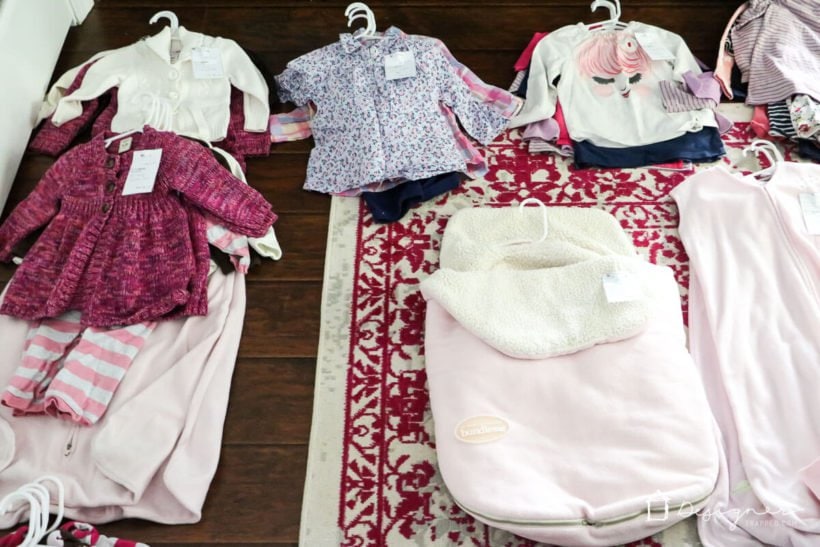
If an item is broken, damaged or worn out, trash it. Don’t hold on to items thinking you’ll repair them, unless you are truly diligent about repurposing and repairing. If you’ve got a pile building up in your workspace, it’s time for a reality check. If you aren’t going to get to repairing or repurposing in the next week or two, take a cue from Elsa of Frozen and let it goooo.
Rule #3: Get Rid of it Quickly
So, remember what I said about toddler clothes? Part of the reason they were cluttering up the guest closet was that I didn’t stick to my own rule. I put them aside, saying I’d get to donating them (because I wasn’t ready to let them go). BUT, as mentioned above, I recently got my act together and sold them at a consignment sale. What didn't sell, we donated. And just like that, they were finally out of our house and going to be used by another family. YAY!
Here's the thing… If you put items aside to donate, but they end up in the trunk of your car or garage for six months, you haven’t actually decluttered. You’ve moved the clutter.
Instead, when you’ve made the decision to get rid of an item, make it happen RIGHT AWAY. Plan a trip to Goodwill, or St. Vincent DePaul (or wherever you take your donations). Set up the eBay app on your phone and snap photos as you go, post and sell immediately. Set a short deadline for yourself (two weeks, max) and if it’s not gone, in the trash it goes.
This is an old photo from when my girls and I decluttered and organized their playroom and all the items we decided to let go of were loaded into bags and were donated 2 days later. We didn't let them linger!
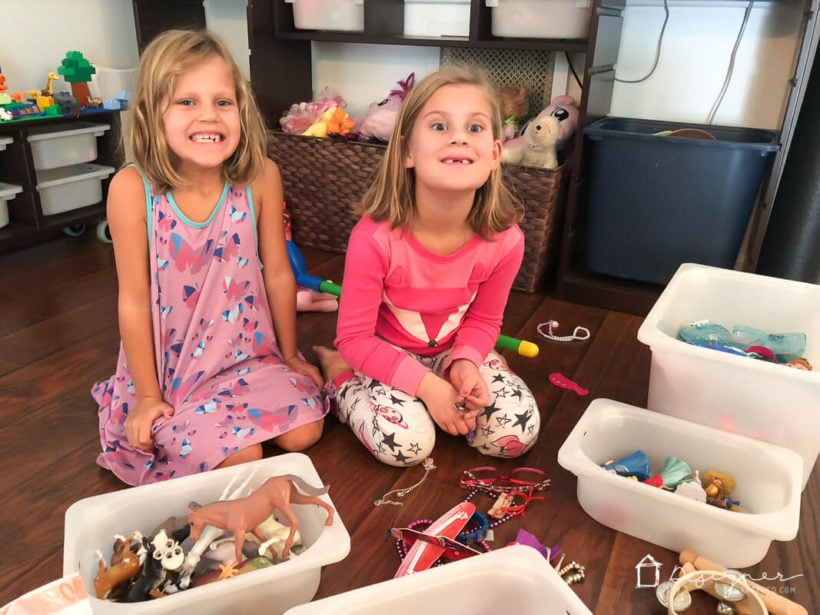
For paperwork, photos and other memorabilia, deal with it, scan and save it (I highly recommend going paperless y'all) and only keep the BEST of the best. If it’s not scrapbook-worthy, frameable, or needed for legal/tax purposes then paperwork only adds to the clutter.
If items are too worn out, don’t sell or if you can’t muster up the motivation to donate, sell or repurpose them QUICKLY, toss them out. Throw them away. It sounds harsh, I know, and many of us HATE being wasteful. I repurpose all kinds of items–you can see how we transformed our old backyard fence into a herringbone plank wall and how we created planters from old light fixtures. If it’s holding you back, you’ll feel glad you got rid of it.
When we hold onto stuff, it weighs us down. It adds chaos to our lives and stress to our homes. It takes our environment from cozy and comforting to suffocating. If you’re emotionally ready to start decluttering your home, I’ve got plenty of resources to help you get started! Check out the episode of our podcast about how to handle your home when you start to feel like you are drowning in stuff: What to Do When Your House Feels Overstuffed.
You may also enjoy these posts:
Wondering how I approach transforming rooms and spaces in our home? Check out Designer in a Binder®.
And if you want exclusive content and behind-the-scenes sneak peeks, be sure to subscribe before you head out!

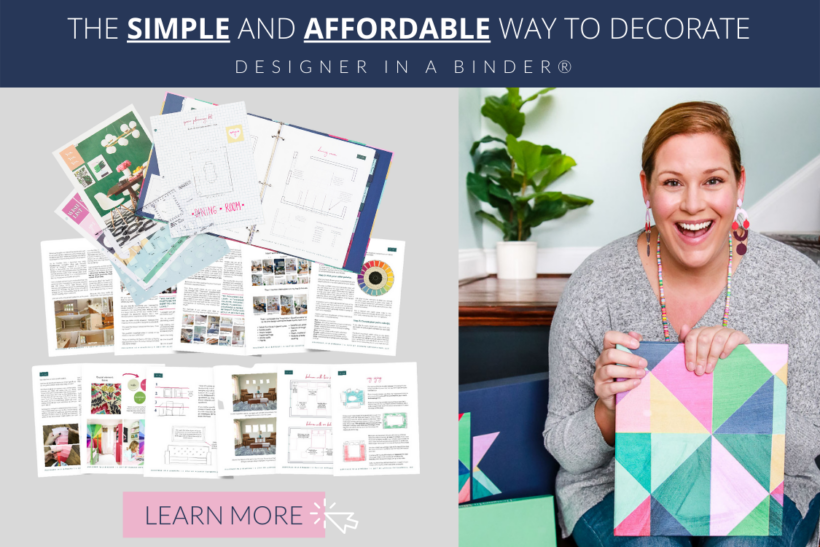
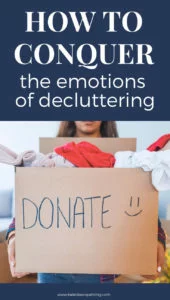
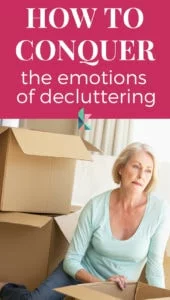
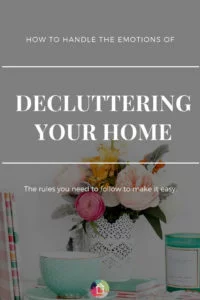
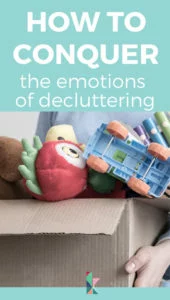
I appreciate this article. I wonder if there are any books you recommend (or podcasts, youtube channels, etc) to deepen in understanding the emotions that arise from decluttering?
Hi Deanna! Yes, absolutely. I highly recommend the Maximized Minimalist Podcast by Katy Joy Wells. It’s FANTASTIC.
I enjoyed your posts, and agree with most of them. My problem and the same for many friends, is dealing with all the furniture, china, crystal and millions of others items we must deal with after parents and other relatives pass away. At 75 it is overwhelming trying to figure it all out. Grown kids are not interested or helpful and often live far away.
That is hard. I remember my mom going through it when my grandmother passed away. After the family identified what they wanted to keep, they worked with an estate auction company to handle the furniture, china, crystal, and other valuable items that none of the family members could keep. It helped a lot.